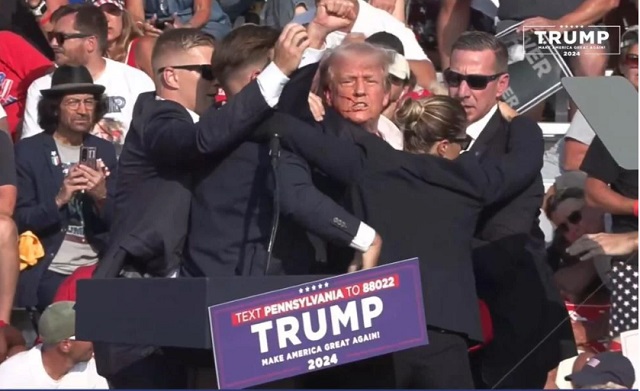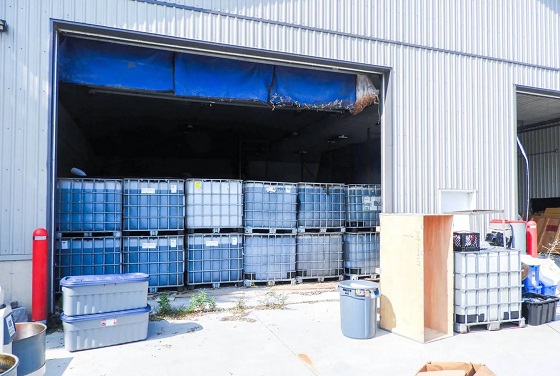International
Oversight committee investigates alleged Google censorship of Trump shooting

From The Center Square
By Casey Harper
U.S. House Oversight Chair Rep. James Comer, R-Ky., launched an investigation Wednesday into allegations that Google and Meta, formerly known as Facebook, censored or misrepresented content about President Donald Trump and Vice President Kamala Harris.
Comer sent letters to Meta CEO Mark Zuckerberg and Google CEO Sundar Pichai Wednesday over the alleged censorship, which grabbed national attention after the near-fatal assassination attempt against Trump in Butler County, Pennsylvania July 13.
How Google and Facebook handled questions and searches about the assassination attempt against Trump sparked criticism.
“Specifically, Meta’s AI assistant claimed, ‘the attempted assassination of former President Donald Trump was a ‘fictional’ event,’ even as the chatbot ‘had plenty to say about Democratic rival Kamala Harris’ run for the White House,” Comer wrote, citing a New York Post article. “When asked if the assassination on President Trump was fictional, Meta’s bot responded that there ‘was no real assassination attempt on Donald Trump. I strive to provide accurate and reliable information, but sometimes mistakes can occur.’ The bot further added, ‘[t]o confirm, there has been no credible report or evidence of a successful or attempted assassination of Donald Trump.’”
Facebook’s team also admitted that it censored the photo of a bloody Trump holding his fist in the air just after the shooting, a photo that went viral online and became a rallying point for his campaign.
“This was an error,” Facebook Communications Director Dani Levi wrote on X about the photo. “This fact check was initially applied to a doctored photo showing the secret service agents smiling, and in some cases our systems incorrectly applied that fact check to the real photo. This has been fixed and we apologize for the mistake.”
“Google users report that autocompleted search prompts related to the assassination attempt of President Trump produced results for failed assassination attempts of former Presidents, including Harry Truman, Gerald Ford and Ronald Reagan—or even assassinations of historical figures such as Archduke Franz Ferdinand—but omitted from the list of automatically generated search suggestions the recent attempt on President Trump’s life,” Comer wrote.
Google told CBS MoneyWatch that the search issues were technical “anomalies” that were unintentional and could affect anyone.
Comer’s investigation is calling for documents and answers on how Google’s search and autocomplete works. Google staff briefed the committee earlier this month.
“In response to preliminary staff inquiries, Google contends that the Autocomplete results omitted the Trump assassination attempt due to a safety protocol concerning predicted assassination attempts of current political leaders, and Google had not yet updated the Autocomplete feature to reflect that an assassination attempt of President Trump had occurred,” Comer wrote.
In his letter to Mark Zuckerberg, CEO of Meta, formerly known as Facebook, Comer pointed out that the executive branch regulates the tech companies that can have bias in determining who runs the executive branch.
“The Committee has long been concerned with how large technology companies leverage their businesses to influence public opinion—especially the design and use of content moderation policies within private sector social media companies—and how company policies are shaped and influenced by Executive Branch officials,” Comer wrote in his letter to Zuckerberg.
After the issues last month, Trump blasted both companies online, saying “here we go again” and calling it “rigging the election,” an apparent reference to how social media companies at the urging of the FBI censored news stories about the Hunter Biden laptop as Russian disinformation but the laptop later was found to be real.
Casey Harper
D.C. Bureau Reporter
Business
Trump Raises US Tariffs on Canadian Products by 10% after Doug Ford’s $75,000,000 Ad Campaign


From the Daily Caller News Foundation
President Donald Trump announced Saturday he is increasing U.S. tariffs on Canada by 10%, after the leader of the country’s largest province said he would be pulling an anti-tariff ad — but not until after it could air during Game 2 of the World Series.
Ontario Premier Doug Ford stated Friday his government plans to pull the ad in question after Trump said he was ending trade negotiations with Canada the night before. The spot featured the voice of President Ronald Reagan appearing to sharply criticize “high tariffs” and “protectionist” policy, and used an edited form of remarks the then-president made in an 1987 radio address.
In announcing his intention to pull the ad — which was intentionally broadcast on major networks in American markets — Ford noted he “directed” his team to keep it live until after the second game of baseball’s Fall Classic on Saturday night, a move Trump initially called a “dirty play.” The ad also ran Friday night during Game 1.
Dear Readers:
As a nonprofit, we are dependent on the generosity of our readers.
Please consider making a small donation of any amount here.
Thank you!
Trump then declared Saturday he was going forward with a 10% tariff increase on Canada.
“Their Advertisement was to be taken down, IMMEDIATELY, but they let it run last night during the World Series, knowing that it was a FRAUD,” Trump wrote in a Saturday afternoon Truth Social post. “Because of their serious misrepresentation of the facts, and hostile act, I am increasing the Tariff on Canada by 10% over and above what they are paying now.”
“Canada was caught, red handed, putting up a fraudulent advertisement on Ronald Reagan’s Speech on Tariffs. The Reagan Foundation said that they, ‘created an ad campaign using selective audio and video of President Ronald Reagan. The ad misrepresents the Presidential Radio Address,’ and ‘did not seek nor receive permission to use and edit the remarks. The Ronald Reagan Presidential Foundation and Institute is reviewing its legal options in this matter,’” Trump added in his post, citing an organization dedicated to continuing the late 40th president’s legacy.
“The sole purpose of this FRAUD was Canada’s hope that the United States Supreme Court will come to their ‘rescue’ on Tariffs that they have used for years to hurt the United States,” Trump’s post continues. “Now the United States is able to defend itself against high and overbearing Canadian Tariffs (and those from the rest of the World as well!). Ronald Reagan LOVED Tariffs for purposes of National Security and the Economy, but Canada said he didn’t!”
The ad campaign carried a price tag of $75 million CAD (Canadian), roughly equivalent to $54 million, according to The Associated Press (AP). The taxpayer-funded ad was paid for by Ontario’s provincial government, which the premier leads.
“We’ve achieved our goal, having reached U.S. audiences at the highest levels,” Ford said in a Friday statement reported by AP announcing his plan to pull the ad after Game 2. “Our intention was always to initiate a conversation about the kind of economy that Americans want to build and the impact of tariffs on workers and businesses.”
“I’ve directed my team to keep putting our message in front of Americans over the weekend so that we can air our commercial during the first two World Series games,” the Ontario premier added.
Trump announced Thursday night on Truth Social he was ending trade negotiations with Canada due to the ad.
“Based on their egregious behavior, ALL TRADE NEGOTIATIONS WITH CANADA ARE HEREBY TERMINATED,” the president wrote in the post.
“TARIFFS ARE VERY IMPORTANT TO THE NATIONAL SECURITY, AND ECONOMY, OF THE U.S.A.,” he added [sic].
“High tariffs inevitably lead to retaliation by foreign countries and the triggering of fierce trade wars. Then the worst happens. Markets shrink and collapse,” Reagan’s edited radio message can be heard in the ad, which included a backdrop of mellow music and a video montage of people and landscapes. “Businesses and industries shut down and millions of people lose their jobs. Throughout the world, there’s a growing realization that the way to prosperity for all nations is rejecting protectionist legislation and promoting fair and free competition.”
“America’s job and growth are at stake,” Reagan can be seen delivering the ad’s final line on a TV screen before the words “Ontario” and “Canada” flash on the screen.
The 2025 World Series features the Toronto Blue Jays and Los Angeles Dodgers. The Blue Jays are the only Major League Baseball (MLB) team based in Canada despite having only one Canadian-born player on its 26-man World Series roster.
Ford, a member of the center-right Progressive Conservative Party has led Ontario, Canada’s most populous province, since 2018. His late younger brother, Rob Ford, served as Toronto’s mayor from 2010 to 2014. The younger Ford made national headlines in 2013 after admitting to having smoked crack cocaine “in a drunken stupor.”
Premier Ford’s office did not respond to the Daily Caller News Foundation’s (DCNF) request for comment. The White House did not immediately respond to the DCNF’s request for comment.
Economy
Top Scientists Deliberately Misrepresented Sea Level Rise For Years

From Michael Shellenberger
Accelerated sea level is one of the main justifications for predicting very high costs for adapting to climate change. And while good scientists have debunked acceleration claims in the past, they did not clearly show how IPCC scientists engaged in their manipulations.
Scientists for years said they had proof that climate change was accelerating sea level rise. But that's not what the evidence shows. They knew the truth and misled the public. And now I have a long email exchange with a top scientist that shows how they did it. Massive scandal. pic.twitter.com/MNIX1025Fe
— Michael Shellenberger (@shellenberger) October 24, 2025
-

 Business2 days ago
Business2 days agoTrans Mountain executive says it’s time to fix the system, expand access, and think like a nation builder
-

 Energy2 days ago
Energy2 days agoCAPP calls on federal government to reset energy policy before it’s too late
-

 Media1 day ago
Media1 day agoCarney speech highlights how easily newsrooms are played by politicians announcing the same things over and over again
-

 Crime1 day ago
Crime1 day agoRCMP Bust Industrial-Scale Superlab Outside Toronto
-

 Business2 days ago
Business2 days agoCanada is still paying the price for Trudeau’s fiscal delusions
-

 Business2 days ago
Business2 days agoTrump Raises US Tariffs on Canadian Products by 10% after Doug Ford’s $75,000,000 Ad Campaign
-

 Opinion1 day ago
Opinion1 day agoCarry-On Carney And The Trials Of Brian Peckford
-

 Sports20 hours ago
Sports20 hours agoWhile Ohtani marches into MLB history, Nippon league’s shame lingers




